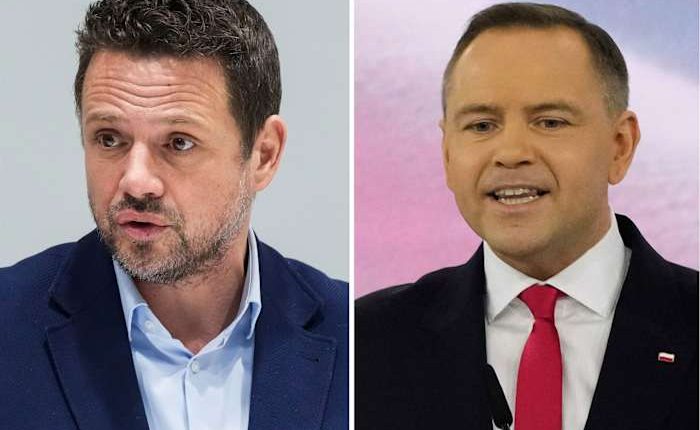Share this @internewscast.com

WARSAW – Poland’s presidential election is far from over, but the first round on Sunday favored candidates from the political right and far right, posing a significant challenge for the centrist government led by Prime Minister Donald Tusk.
Tusk’s pick, the liberal Rafał Trzaskowski, Mayor of Warsaw, and his conservative rival, Karol Nawrocki, supported by the national conservative Law and Justice party, stood out among the 13 contenders. The two were neck and neck, with Trzaskowski receiving 31.36% of the votes and Nawrocki 29.54%, as reported in the final results released on Monday morning.
Poles now head to a nail-biting second round on June 1, with much resting on the outcome of the runoff.
This election is not only about securing the presidency, a role with the authority to shape foreign policy and veto legislation. It will also determine the direction of Tusk’s attempts to mend relations with European allies following the years of governance by Law and Justice, which frequently clashed with Brussels.
Tusk has been trying to reverse changes to the judicial branch that were considered undemocratic by the EU, but his efforts have been largely blocked by outgoing conservative President Andrzej Duda.
Many centrist and progressive voters are also disappointed that Tusk has not delivered on other promises, like liberalizing the restrictive abortion law. He has also been criticized for the heavy handed way he took over control of public media from Law and Justice, and the continued politicization of taxpayer funded public media.
Trzaskowski and Nawrocki wasted no time at all as they head toward the finish line. They got out on the streets early Monday to meet with voters. Trzaskowski handed out sweet yeast buns on the streets of Kielce, and Nawrocki distributed donuts and posed for selfies with supporters in Gdansk.
Trzaskowski, who ran and barely lost to incumbent President Andrzej Duda in 2020, was long considered the frontrunner this year. After Sunday’s vote he can’t be sure of anything.
Nawrocki declared himself “full of energy and enthusiasm on the way to victory” in a statement to the media, adding that “probably all of Poland saw that Rafał Trzaskowski is a candidate who can’t cope.”
Meanwhile, Trzaskowski vowed to fight until the end. “I will try to convince young people and all those who voted differently that it is worth voting for a normal Poland, not a radical Poland,” Trzaskowski said during a press briefing in Skarzysko-Kamienna.
The two men’s political fates rest to a large extent with voters who chose other candidates in the first round, and how they will vote can be difficult to predict. Experts warn that there isn’t an automatic transfer of votes from certain candidates to others; some who don’t get their chosen candidate might not vote at all.
Still, Trzaskowski has a lot to worry about.
One in five voters opted for candidates on the far right, whose conservative and nationalistic worldviews align much more closely with Nawrocki’s.
Sławomir Mentzen of the hard-right Confederation party won 14.8%, while Grzegorz Braun, even further to the right, won over 6%. Both have used antisemitic and anti-Ukrainian language, and Braun used a fire extinguisher to put out candles on a menorah that were lit for the Jewish holiday of Hanukkah in the Polish parliament in 2023.
Candidates from parties in Tusk’s coalition government — which includes left-wing, centrist and center-right parties — together won about 40%.
Copyright 2025 The Associated Press. All rights reserved. This material may not be published, broadcast, rewritten or redistributed without permission.











